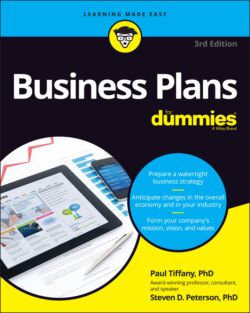Читать книгу Business Plans For Dummies - Paul Tiffany - Страница 49
Credit cards and crowdfunding
ОглавлениеAnother tactic that some start-up founders pursue is to max out their credit cards. The co-founder of SellMax, a nationwide used-car buying service started in San Diego, California, used his business card to pay for critical media advertising as no other funds were available; this was a lifesaver, and the firm is thriving today some 25 years after launch. Additionally, the fraud protection benefit offered by many credit card suppliers gives a safeguard to business newbies who might otherwise fall prey to the many scammers out there offering (false) help. And don’t forget those points that accumulate when you use a credit card for purchases; they can be converted into payment for travel expenses such as airfare, hotel stays, and meals needed to get the business up and running when cash is short.
But keep in mind that credit card financing terms are typically some of the most onerous on the planet, short of funds from organized criminal syndicates — and even some of the latter look good by comparison! If you need to leverage your wallet plastic in order to fund your start-up, it should be a desperate last resort when you are absolutely and unequivocally convinced of the soundness of your plan; you have exhausted all other means of funding; and you — and your dependents — can take the financial hit if your great new business idea dies in the cradle. So be forewarned, and not excessively foolish.
How you get funded today through more formal means has become interesting, to say the least. Like so many other sectors of the economy, deregulation and modern technology have transformed the banking business into a kind of Wild West with the emergence of cryptocurrencies and their disruptive variants (many originating from new venture firms that could benefit from reading this book). In the past your friendly local banker was the go-to source — and you had to go through many ritual genuflections to come away happy. But, for good or bad, not today: Available funds can be no more than a computer click away and available in a flash through a so-called “De-Fi” lender (decentralized finance). If you have even minimal assets — and sometimes even if your only advantage is that you’re breathing — there’s likely some place out there that will consider or grant funds if your idea is solid and your business plan coherent.
These new kids on the block are increasingly online in nature, from subsidiaries of established lenders such as big banks to go-fund-me and crowdsourcing sites that have sprung up like lilies after a hard rain. It’s likely worth your time to investigate some of that terrain if you think your chances with a more traditional lender look shaky. You might want to create a fundraising page on the web (one current how-to-do-this site: www.spotfund.com). Conversely, just Google “crowdsourcing” on your laptop, and you’ll instantly find numerous hits. Here are a few you might consult (chosen randomly with no endorsement implied or intended):
www.askforfunding.com
www.ideapros.com
www.kickstarter.com
www.startengine.com
